Leadbay Alternatives
Considering a switch from Leadbay? This guide compares 10 alternatives, analyzing their features, pricing, and potential drawbacks.

Leadbay is a tool B2B sales reps use for lead generation and scoring. It's simple to use for finding prospects and accurately predicts which leads will convert, helping teams focus on ready-to-buy leads.
But like any tool, it has limits. Some users note its data is mainly European, and pricing isn't public. We analyzed top G2 alternatives, comparing their pros and cons against Leadbay to help you find the best fit. Let's get started.
Before the List: A Look at 11x
If your sales team is exploring the use of digital workers, 11x presents a different approach. It offers autonomous agents that can handle specific sales development tasks, which may be a fit for organizations looking to automate parts of their sales process.
11x is a GTM platform that uses AI agents to manage the sales process. Its agent, Alice, finds high-intent prospects, conducts outreach on email and LinkedIn, and keeps the CRM updated. A second agent, Julian, qualifies inbound leads and books meetings.
The platform unifies data enrichment, outreach, and email warmup, which removes the need for separate point solutions.
Leadbay Alternatives
Below, we review the top Leadbay alternatives. Each review covers pricing, main features, and how they compare to Leadbay in terms of advantages and drawbacks.
1) Apollo.io
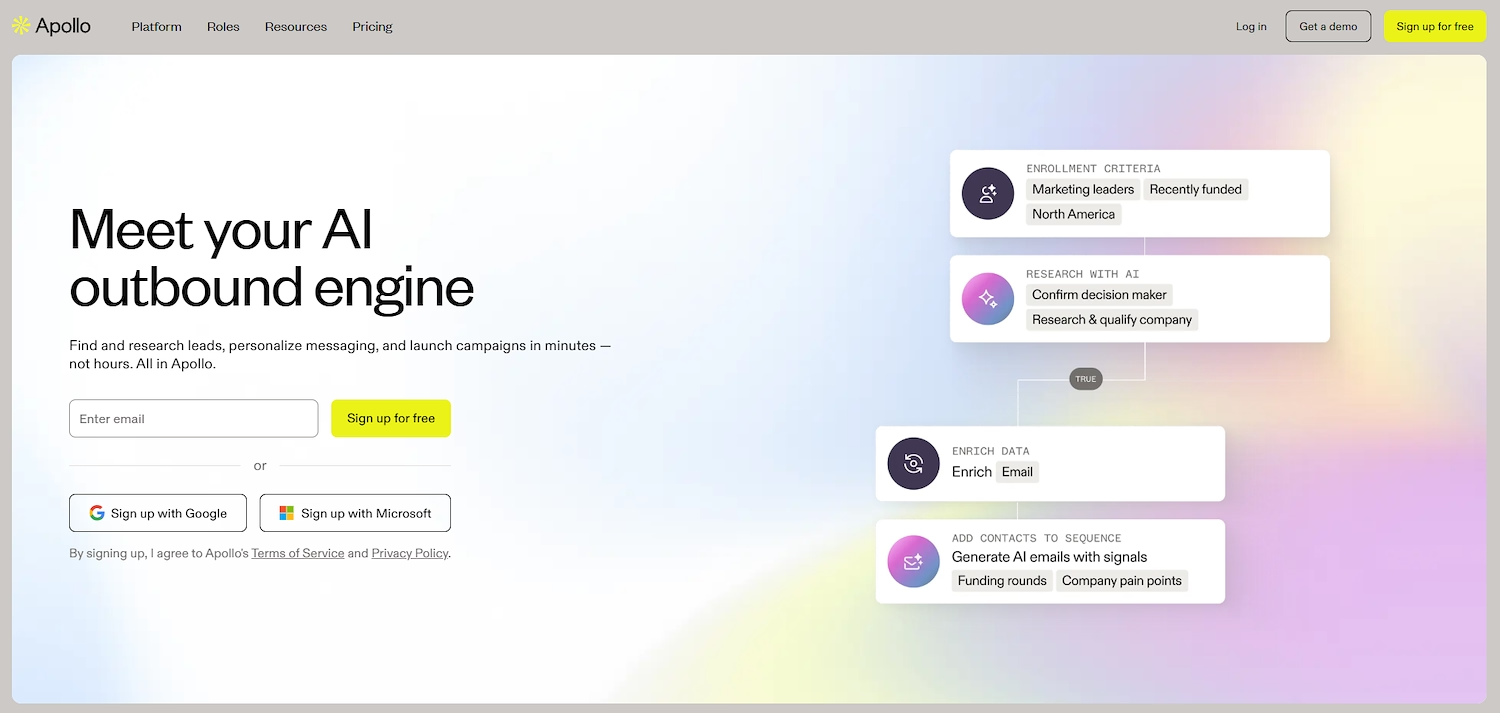
Apollo.io is a sales intelligence platform with a large contact database. It helps sales teams prospect, engage contacts, and automate workflows. The tool combines data with outreach and analytics features to support the sales process.
The platform's function is to unify these activities in one place for go-to-market teams. This approach can reduce the number of separate tools for data and outreach, which simplifies the sales technology stack.
Apollo.io's Main Features
Provides an engagement suite to run outreach campaigns across different channels.
Automates sales activities and workflows using a rules engine.
Includes analytics dashboards to track campaign performance and sales results.
How Apollo.io Compares to Leadbay
Average Review Score: 4.7/5 stars based on 8,904 G2 reviews.
Apollo.io provides a global database of over 210 million contacts, offering broader reach compared to Leadbay's primarily European data focus.
Its pricing is transparent with multiple tiers, including a free option, whereas Leadbay does not make its pricing public.
The platform is an all-in-one solution with an engagement suite and analytics, while Leadbay concentrates on lead generation and scoring.
A rules engine for workflow automation is a key feature. This provides more extensive automation possibilities than Leadbay's lead scoring function.
Apollo.io's Limitations Compared to Leadbay
Some users find Apollo.io has a steeper learning curve due to its many features, while Leadbay offers a more direct, focused user experience.
The tool's lead scoring can seem less specialized than Leadbay's, which dedicates its platform to accurate lead conversion predictions.
Its global database sometimes contains inaccuracies, according to user reviews. Teams that require only European data might prefer Leadbay's regional specialization for higher data consistency.
Pricing and Cost-Effectiveness
Apollo.io provides transparent pricing, including a free plan and paid tiers starting at $49 per user per month. In contrast, Leadbay’s pricing is not public, which requires contacting them for a quote. This makes Apollo.io a more direct option for teams that need clear, upfront cost information.
2) ZoomInfo SalesOS
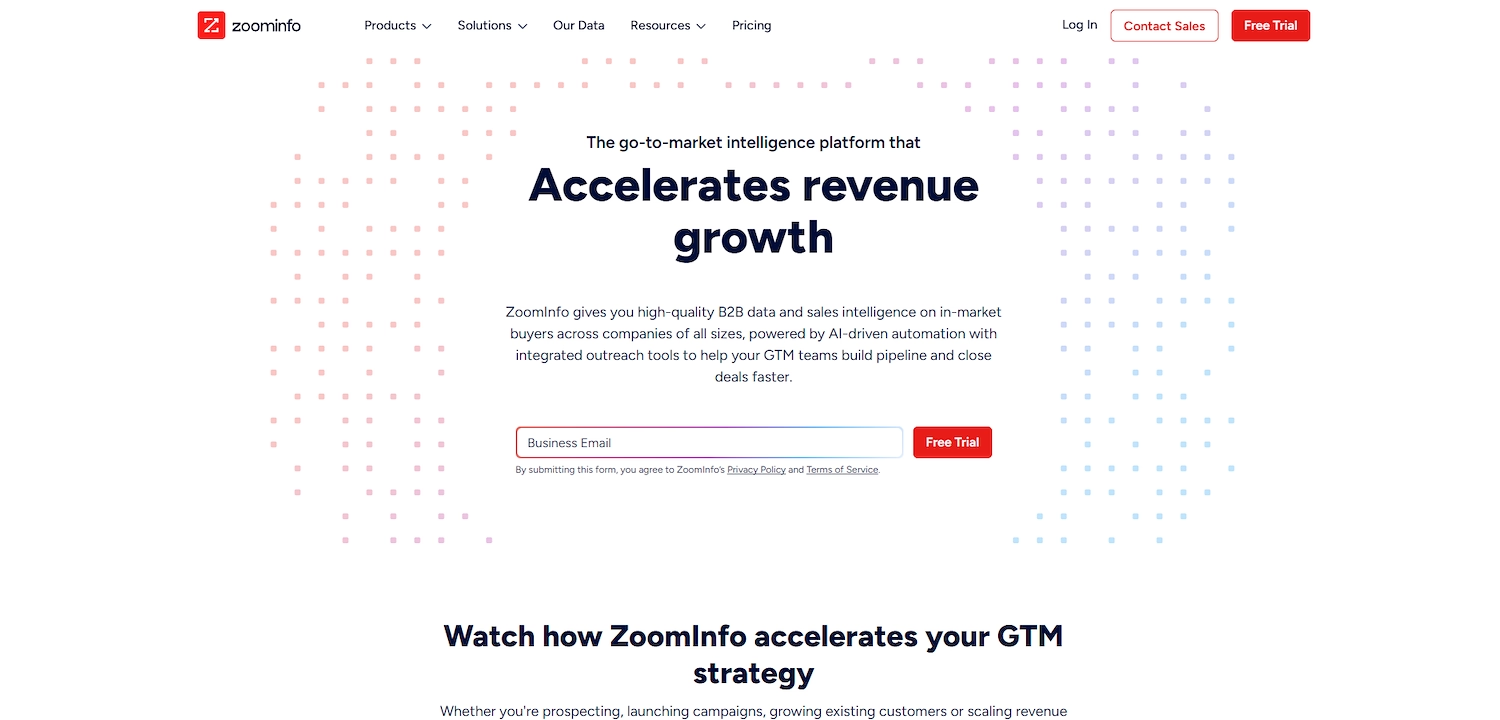
ZoomInfo SalesOS is an AI-powered, go-to-market intelligence platform for B2B companies. It unifies contact data, company information, and buyer-intent signals with engagement tools. The system helps revenue teams identify, connect with, and close buyers.
It provides a central data source for sales, marketing, and revenue operations. The platform supports prospect discovery, pipeline development, and the automation of data workflows to aid account growth.
ZoomInfo SalesOS's Main Features
Provides conversation intelligence to analyze interactions from calls and meetings.
Identifies anonymous website visitors and engages them with a real-time website chat feature.
Includes a generative AI companion, Copilot, to surface insights and draft outreach messages.
Automates go-to-market activities using trigger-based workflows.
How ZoomInfo SalesOS Compares to Leadbay
Average Review Score: 4.5/5 stars based on 8,738 G2 reviews.
ZoomInfo SalesOS offers a large, frequently updated global database, which provides a wider reach for prospecting compared to Leadbay's focus on European data.
It includes a generative AI companion, Copilot, to help draft outreach messages, offering a different type of AI assistance than Leadbay's predictive lead scoring.
The platform provides conversation intelligence to analyze calls and meetings, a feature that supports sales coaching beyond Leadbay's core functions.
Its ability to identify anonymous website visitors and engage them with chat provides an inbound lead channel that is different from Leadbay's outbound focus.
ZoomInfo SalesOS's Limitations Compared to Leadbay
The platform's extensive features can result in a higher price and a longer implementation time. Teams that need a simple lead generation tool might find Leadbay's focused approach more straightforward.
Its wide range of features can create a steeper learning curve for new users. In comparison, Leadbay provides a more direct experience, as its main function is lead generation and scoring.
Some users report that the global database can contain outdated information. Companies that operate only in Europe might find Leadbay's regional specialization offers more consistent data for their market.
Pricing and Cost-Effectiveness
ZoomInfo SalesOS and Leadbay both use a quote-based model, so neither makes pricing public. While ZoomInfo is generally perceived as a higher-cost option, you should visit the ZoomInfo SalesOS's official website for a detailed quote based on your needs.
3) Lusha
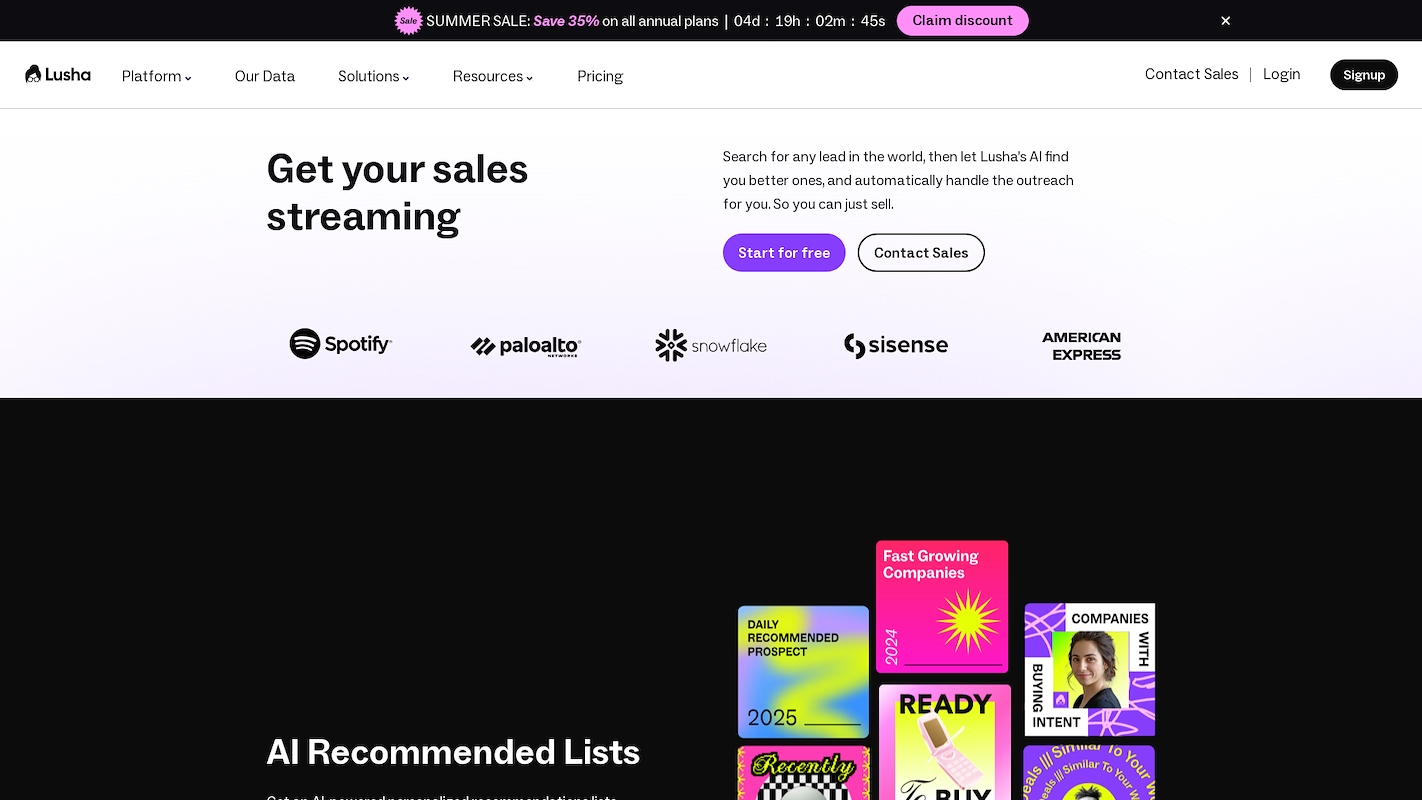
Lusha is a sales intelligence platform for revenue teams to find B2B leads worldwide. It provides AI-based recommendations for new prospects and automates outreach. Users build accurate lists and prioritize contacts with buyer-intent signals.
The platform enriches CRM records with current data and integrates compliant B2B information into sales and marketing stacks. It holds GDPR, CCPA, and ISO certifications.
Lusha's Main Features
Records and analyzes sales meetings.
Automates and personalizes email sequences with AI-driven copy.
Identifies in-market buyers and sends real-time notifications on intent triggers.
Searches for contacts and companies using filters like buyer intent and funding rounds.
How Lusha Compares to Leadbay
Average Review Score: 4.3/5 stars based on 1,516 G2 reviews.
Lusha offers transparent pricing with several tiers, including a free plan. This is different from Leadbay, which requires a custom quote and does not publish its pricing.
Its database is global, providing a wider reach for prospecting compared to Leadbay's primary focus on European data.
The platform uses AI Prospect Playlists to automatically generate and update lead lists. This offers a different approach to automation than Leadbay's predictive lead scoring.
It identifies in-market buyers and sends real-time alerts. This intent data feature gives sales teams a timing advantage that is not a core part of Leadbay's offering.
Lusha's Limitations Compared to Leadbay
Lusha does not offer a specialized predictive lead scoring engine. In contrast, Leadbay's core function is to predict which leads will convert, helping teams focus their efforts on prospects who are ready to buy.
Some users report that its global database can have occasional inaccuracies. Teams that need high-quality European data might find Leadbay's regional specialization provides more reliable information for their specific market.
The platform's wide range of features can introduce complexity for teams that need a simple tool. Leadbay provides a more focused user experience, as its platform concentrates on lead generation and scoring.
Pricing and Cost-Effectiveness
Lusha offers transparent pricing with a free plan and paid tiers starting at $36 per user per month, while Leadbay requires a custom quote. This makes Lusha a more accessible option for teams that need predictable costs. You can check the detailed pricing on Lusha's official website.
4) Cognism
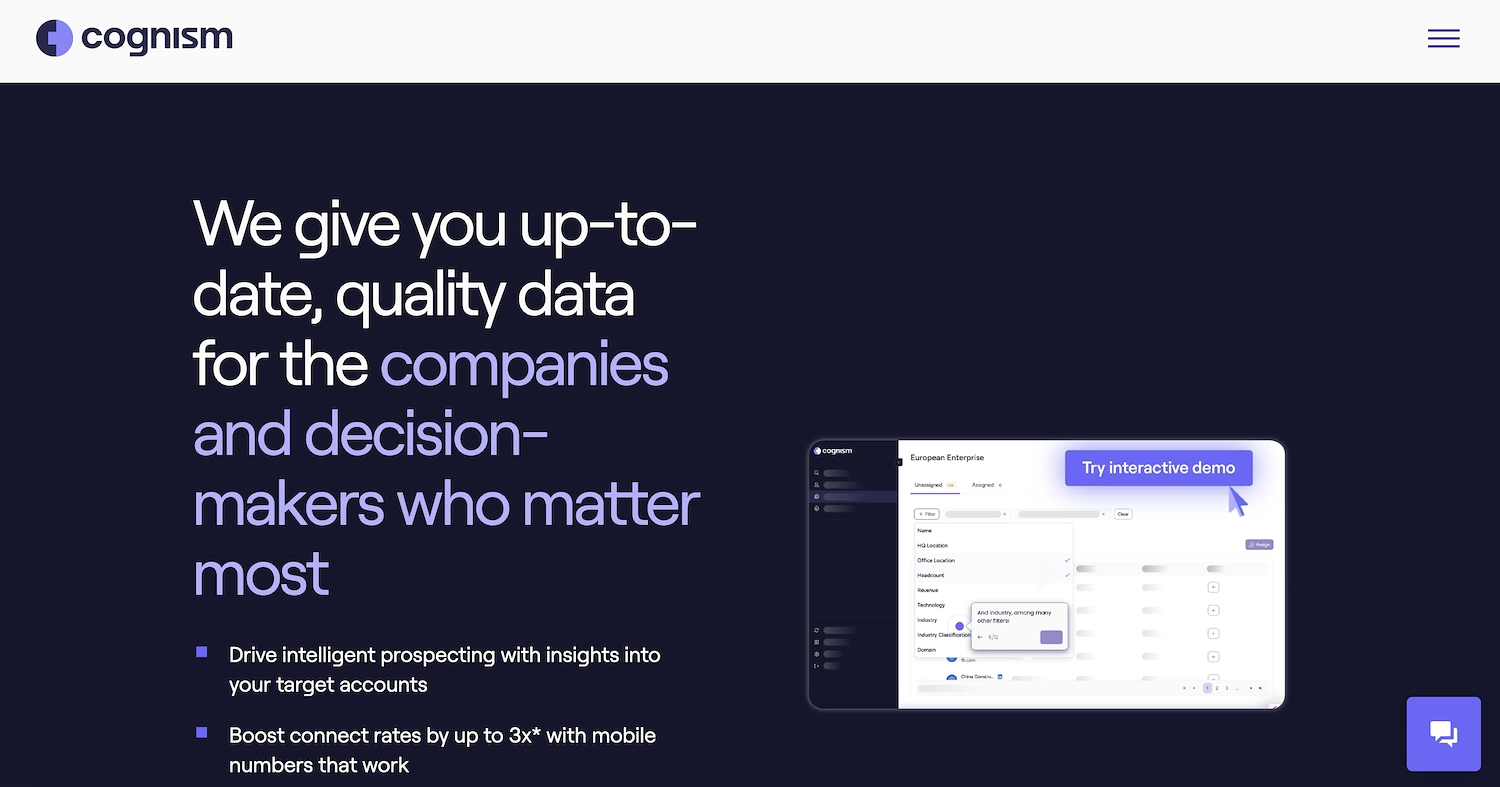
Cognism is a revenue intelligence platform for B2B companies. It provides sales and marketing teams with globally compliant contact and company data. This information helps teams find new accounts and supports go-to-market motions to build sales pipeline.
Cognism's Main Features
Provides phone-verified, human-checked mobile numbers, known as Diamond Data®, to increase connect rates.
Surfaces buying signals from hiring trends, funding rounds, and technographic changes for timely outreach.
Offers a database of VP-level and above contacts, screened against Do-Not-Call lists for compliant outreach.
Includes a browser extension, Sales Companion, for contact suggestions and AI-powered search on websites.
How Cognism Compares to Leadbay
Average Review Score: 4.6/5 stars based on 1,033 G2 reviews.
Cognism provides phone-verified mobile numbers, known as Diamond Data®, to help increase connect rates. This offers a different level of data verification compared to Leadbay's standard contact information.
It surfaces buying signals from company changes like funding rounds. This allows for timely outreach, which is a different approach from Leadbay's predictive scoring of existing leads.
The tool offers a database screened against global Do-Not-Call lists for compliant outreach. This is a specific compliance feature not highlighted in Leadbay's offering.
Its browser extension suggests contacts directly on websites. This provides a more integrated prospecting workflow compared to working solely within the Leadbay platform.
Cognism's Limitations Compared to Leadbay
Cognism lacks a dedicated predictive lead scoring engine. In contrast, Leadbay's core function is to predict lead conversion, which allows sales teams to focus on prospects with high purchase intent.
The tool's broad, global database can sometimes contain outdated information. Teams that operate exclusively in Europe might find Leadbay's regional specialization offers more consistent data for their specific market.
Its extensive features can result in a higher price and a steeper learning curve for new users. Leadbay provides a more focused experience, which might be more suitable for teams that need a simple lead generation and scoring tool.
Pricing and Cost-Effectiveness
Both Cognism and Leadbay use a quote-based pricing model, so you will need to contact them for a custom quote. While user reviews suggest Cognism is a premium-priced option, you should visit Cognism's official website for accurate details.
5) Seamless.ai
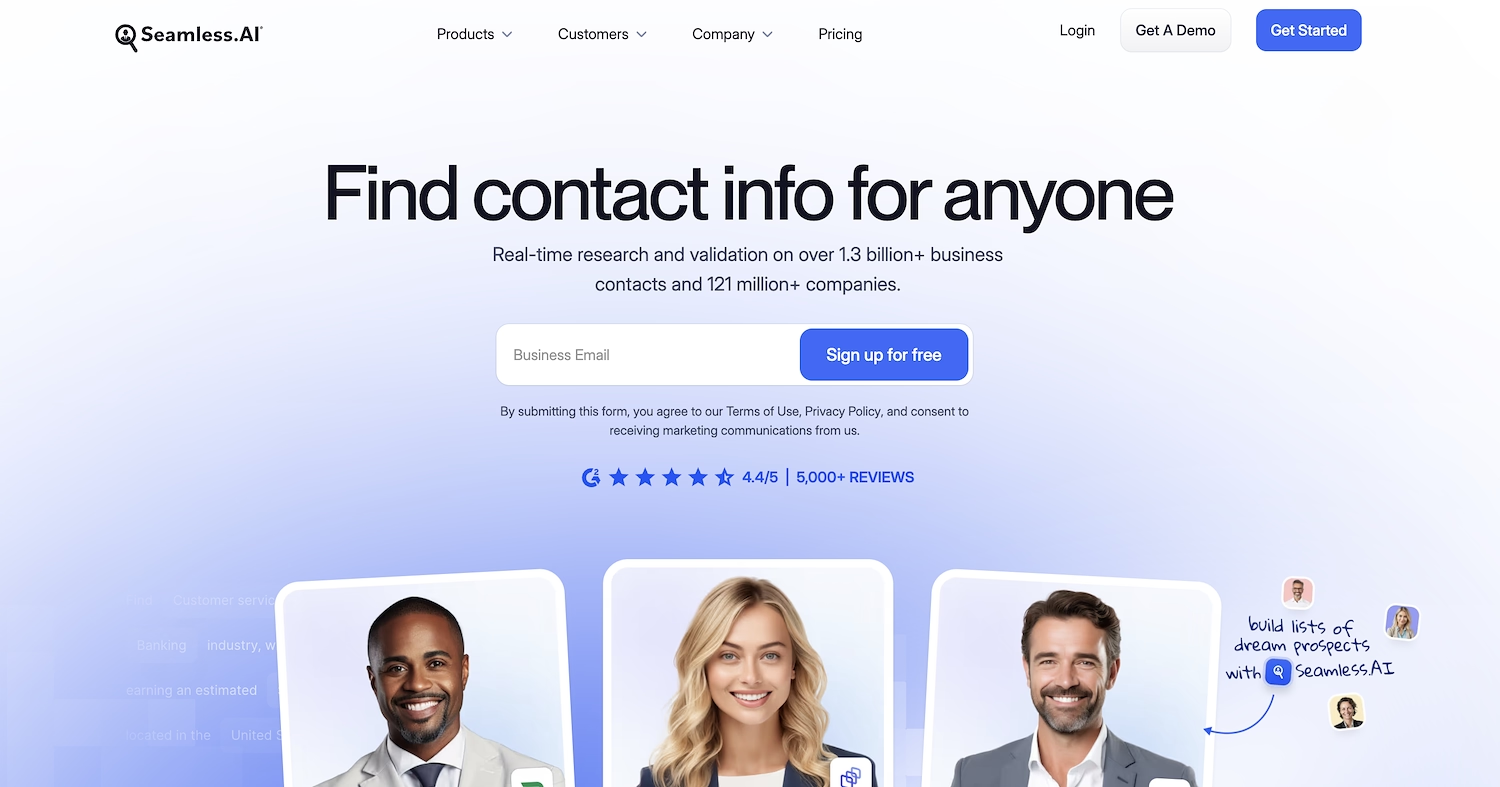
Seamless.ai is a revenue intelligence platform for B2B companies. It provides sales teams with contact and company data to find prospects and build lead lists. The system helps users connect with potential buyers and supports go-to-market activities.
Seamless.ai's Main Features
Detects and sends alerts on customer or prospect job changes and captures the new contact information.
Generates research and personalized messaging for each prospect using AI.
Automates list-building workflows to keep the sales pipeline generating hands-free.
Offers an API to build custom lead-generation engines or embed data into proprietary systems.
How Seamless.ai Compares to Leadbay
Average Review Score: 4.4/5 stars based on 5,067 G2 reviews.
Seamless.ai sends alerts when prospects change jobs, which helps with timely outreach. This function differs from Leadbay's focus on lead conversion prediction.
It uses AI to generate personalized messages for prospects. This is a different use of AI compared to Leadbay's predictive score model.
The platform automates lead list creation to keep the sales pipeline full. This approach is more hands-off compared to Leadbay's lead generation functions.
An available API allows teams to build custom lead-generation engines, which provides more flexibility than Leadbay's standard platform.
Seamless.ai's Limitations Compared to Leadbay
Seamless.ai does not offer a specialized predictive lead scoring engine. This is different from Leadbay, whose core function is to predict which leads will convert, which helps teams focus on ready-to-buy prospects.
Some users report that its global database can have occasional inaccuracies. For companies that need high-quality European data, Leadbay's regional specialization might provide more reliable information for that specific market.
The tool's wide range of features can create a more complex experience. Leadbay provides a more focused platform for teams that need a simple tool for lead generation and scoring.
Pricing and Cost-Effectiveness
Both Seamless.ai and Leadbay use a quote-based pricing model, so you will need to contact them for a custom quote. For the most accurate pricing information, visit Seamless.ai's official website.
Consider 11x for Your Sales Process
For teams interested in sales automation, 11x provides digital workers to handle specific tasks. This approach may suit organizations that want to integrate autonomous agents into their sales process. Explore the 11x platform to see if it fits your needs.
Final Thoughts on 11x
At 11x, we use AI to manage the sales process. Our agent Alice finds accounts, enriches data, and handles outreach, while Julian qualifies inbound leads and books meetings. We combine data enrichment, outreach, and email warmup into one platform, removing the need for multiple point solutions.
Book a demo to see our platform in action.
6) RocketReach
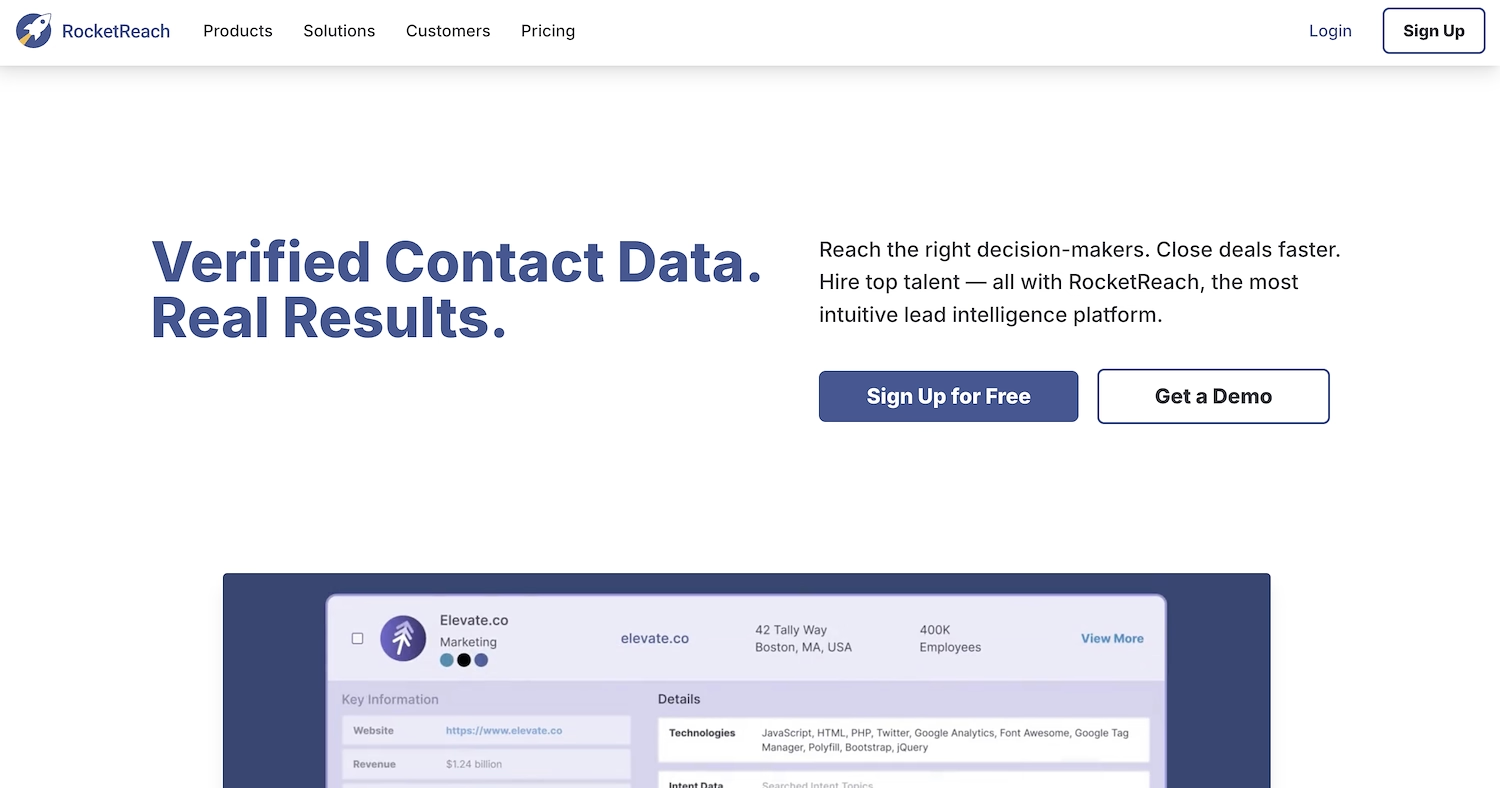
RocketReach is a platform with a database of contact and company information. Sales and marketing teams use this data to find and connect with prospects. The tool supports recruitment, lead generation, and market research through its collection of professional profiles and company details for outreach.
RocketReach's Main Features
Offers a database of contact and company information for outreach and lead generation.
Supports recruitment efforts with access to a large collection of professional profiles.
Aids market research by providing access to company details and data.
How RocketReach Compares to Leadbay
Average Review Score: 4.4/5 stars based on 918 G2 reviews.
RocketReach has a database of over 700 million professionals worldwide, which offers a broader reach than Leadbay's primarily European data focus.
The tool provides transparent pricing, including a free plan. This is different from Leadbay, which requires a custom quote for its services.
It offers an API for custom solutions and integrates with platforms like Salesforce and HubSpot, providing more flexibility than Leadbay's standard platform.
RocketReach provides specialized data for industries like healthcare, a more targeted approach than Leadbay's general lead generation.
Its browser extension allows users to find contact information directly on websites, which offers a different workflow from working only inside the Leadbay platform.
RocketReach's Limitations Compared to Leadbay
RocketReach does not offer a predictive lead scoring engine. This is different from Leadbay, whose main function is to predict which leads will convert, helping teams focus on ready-to-buy prospects.
Some users report that its large, global database can sometimes contain inaccuracies. Teams that need high-quality European data might find Leadbay's regional focus offers more consistent information for their specific market.
The tool's primary function is data retrieval, which is less specialized than Leadbay's platform. Leadbay offers a more focused experience centered on lead generation and conversion prediction, which may be simpler for teams with that specific need.
Pricing and Cost-Effectiveness
RocketReach offers transparent pricing with a free plan and paid tiers starting at $99 per month. In contrast, Leadbay requires a custom quote, making RocketReach a more direct option for teams that need predictable costs. You can find detailed pricing on RocketReach's official website.
7) Snov.io
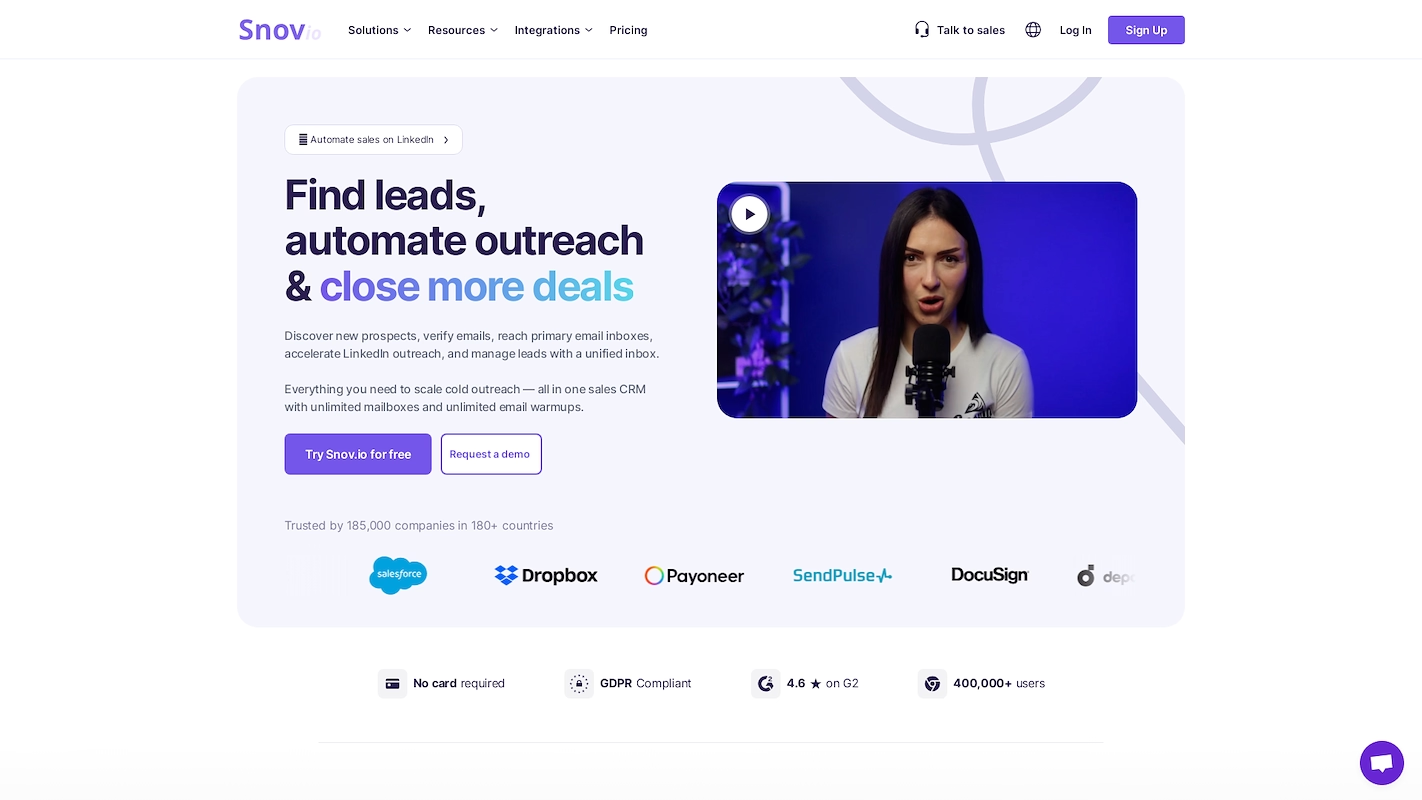
Snov.io is a sales automation platform that provides tools for sales and marketing teams. It helps users find and verify professional email addresses and create automated outreach campaigns. The system supports lead generation and prospect engagement through personalized email sequences, which allows teams to manage their outreach process from a single toolkit.
Snov.io's Main Features
Offers a 7-tier email verifier with 98% accuracy and a deliverability toolkit for automated email warm-ups.
Provides cold email and multichannel campaigns with unlimited sender accounts and a unified inbox.
Includes a built-in sales CRM with Google Calendar sync, automated deal stages, and deal-loss analytics.
Automates LinkedIn outreach with auto-actions, large-scale personalization, and a safe cloud mode.
How Snov.io Compares to Leadbay
Average Review Score: 4.6/5 stars based on 450 G2 reviews.
Snov.io includes a built-in sales CRM to manage deals and pipelines. This provides a more complete sales toolkit compared to Leadbay, which focuses on lead generation and scoring.
The platform offers an email verifier and a warm-up toolkit to improve deliverability. This is a different approach to data quality than Leadbay's regional data specialization.
It automates outreach on LinkedIn and email. This provides engagement features that are not part of Leadbay's core function of finding and scoring leads.
Snov.io provides transparent pricing with multiple tiers, including a free trial. This is different from Leadbay, which requires a custom quote for its services.
Snov.io's Limitations Compared to Leadbay
Snov.io lacks a predictive lead scoring engine. Leadbay's main function is to predict lead conversion, which allows sales teams to focus on prospects with high purchase intent.
The tool's global database can sometimes contain inaccuracies, according to user reviews. Teams that operate only in Europe might find Leadbay's regional specialization offers more consistent data for their market.
Its platform includes many features, which can create a steeper learning curve for new users. Leadbay provides a more focused experience for teams that need a simple lead generation and scoring tool.
Pricing and Cost-Effectiveness
Snov.io offers transparent pricing with a free trial and paid plans starting at $39 per month. In contrast, Leadbay requires a custom quote, making Snov.io a more direct option for teams that need predictable costs. You can check detailed pricing on Snov.io's official website.
8) Hunter.io
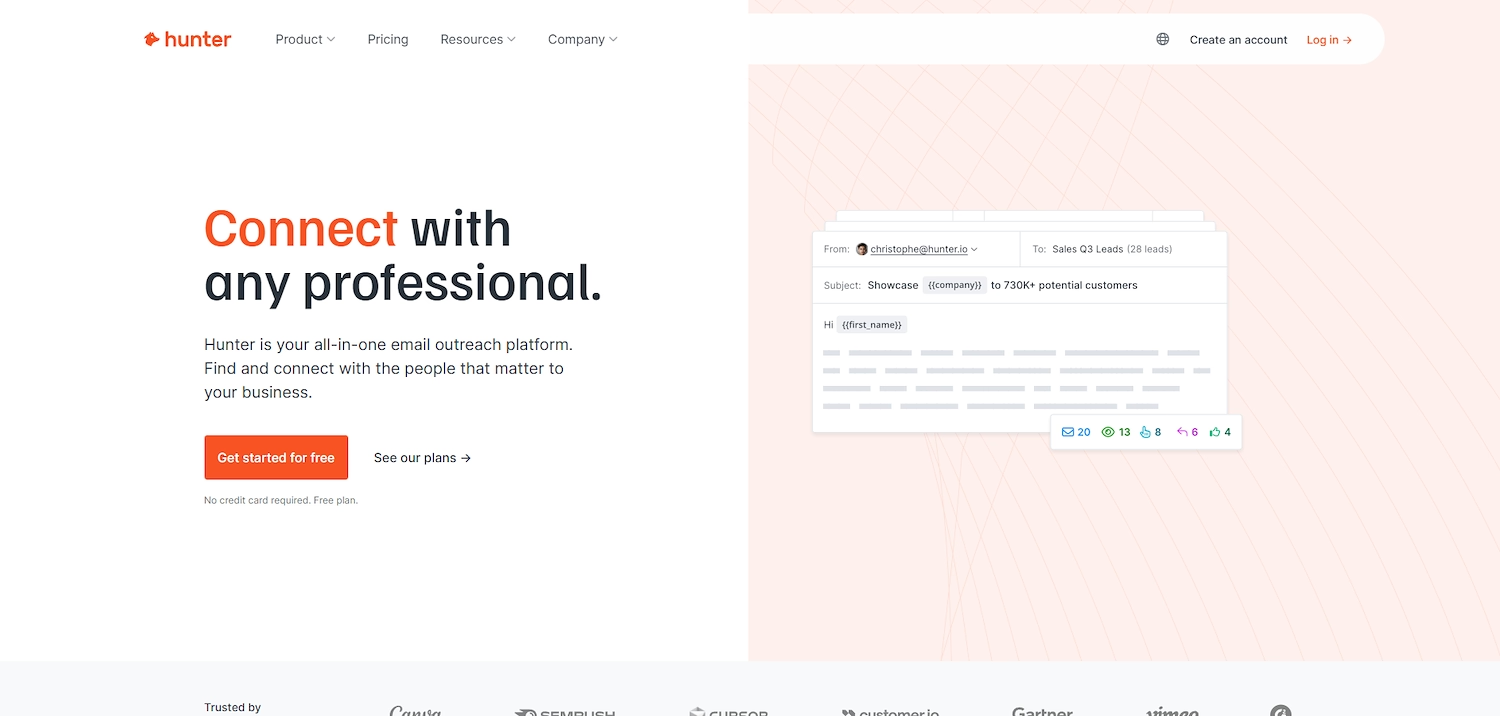
Hunter.io is a platform that finds and verifies professional email addresses. Sales and marketing teams use the tool to build contact lists for outreach campaigns. It allows users to discover a company's email pattern or find a specific professional's contact information to support business connections.
Hunter.io's Main Features
Finds and verifies professional email addresses from web domains, companies, or specific professionals.
Includes a lead builder and data filtering to identify prospects based on an ideal customer profile.
Provides a built-in platform to create and send cold email campaigns.
Offers integrations with CRM and marketing automation platforms to sync data.
How Hunter.io Compares to Leadbay
Average Review Score: 4.4/5 stars based on 592 G2 reviews.
Hunter.io offers transparent pricing with multiple tiers, including a free plan. This is different from Leadbay, which requires a custom quote and does not publish its pricing.
It includes a dedicated email verification tool to confirm the accuracy of contact information. This provides a specific data quality function, whereas Leadbay focuses on predictive lead scoring.
The platform has a built-in tool to send cold email campaigns. This combines outreach with data discovery, while Leadbay concentrates on lead generation and scoring.
This tool focuses specifically on finding and verifying professional email addresses. This offers a direct solution compared to Leadbay's platform, which includes predictive lead scoring.
Hunter.io's Limitations Compared to Leadbay
Hunter.io does not offer predictive lead scoring. This is different from Leadbay, whose platform analyzes and scores leads to identify those with the highest purchase intent. Teams may find Leadbay more direct for prioritizing outreach efforts.
Its focus is on global data. This can be a drawback for companies that need high-quality European contacts, as some users find global databases less reliable for specific regions. Leadbay's specialization in European data may provide more accuracy for those markets.
The tool centers on email discovery and verification. This is different from Leadbay's dedicated platform for lead generation and scoring. For teams that need to predict lead conversion, Leadbay offers a more direct and specialized user experience.
Pricing and Cost-Effectiveness
Hunter.io offers transparent pricing with a free plan and paid tiers starting at $49 per month. In contrast, Leadbay requires a custom quote, making Hunter.io a more direct option for teams that need predictable costs. You can find detailed pricing on Hunter.io's official website.
9) Salesloft
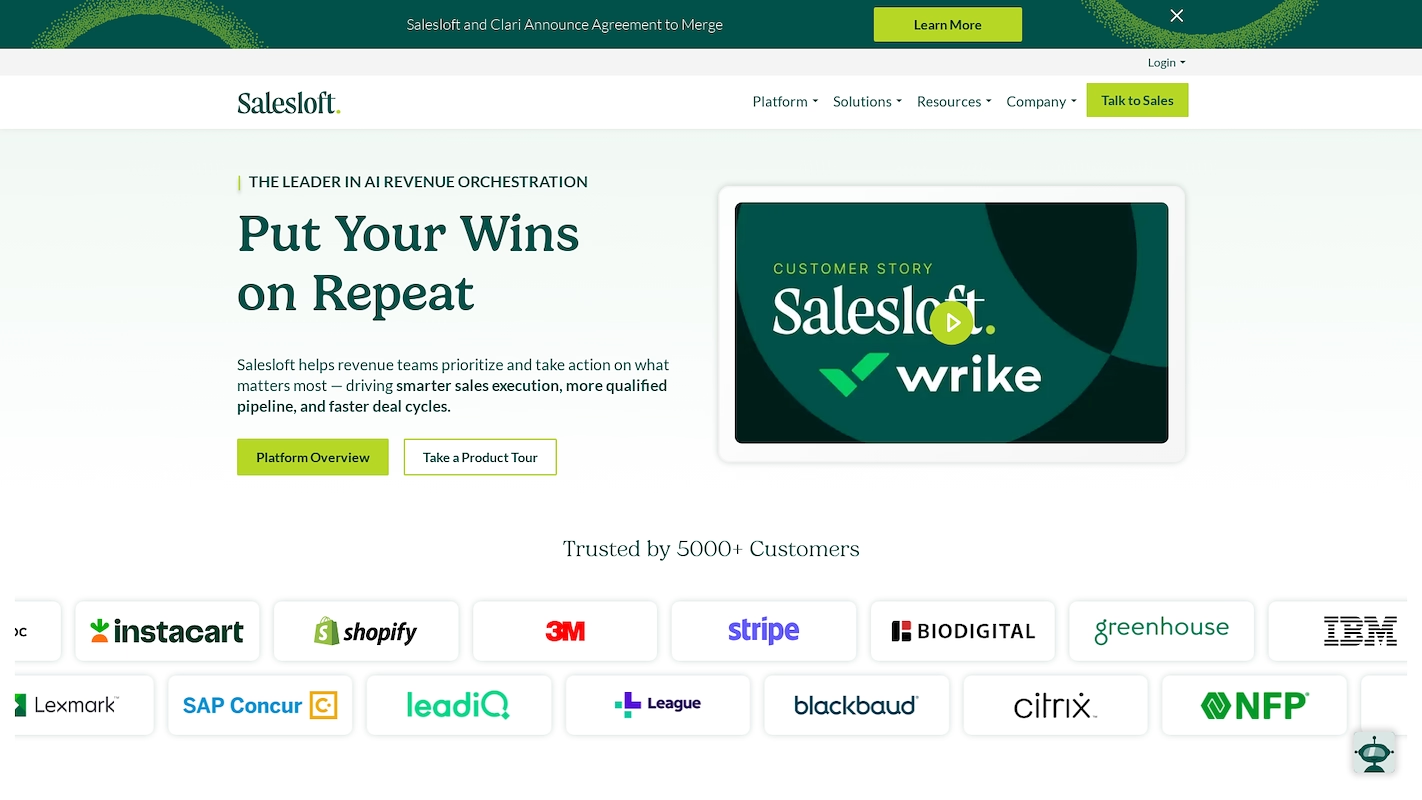
Salesloft is a revenue intelligence platform for sales organizations. It equips teams with tools to execute their sales plays and interact with buyers across the full customer lifecycle. The platform helps sellers build pipeline, manage deals, and forecast revenue, all from a single workspace.
Salesloft's Main Features
Provides calling capabilities, including click-to-call functionality and call recording.
Sends automated, personalized emails and tracks engagement through open rates, link activity, and attachment activity.
Offers analytics and insights to track sales performance and activity.
How Salesloft Compares to Leadbay
Average Review Score: 4.5/5 stars based on 4,145 G2 reviews.
Salesloft provides a full suite of engagement tools, including calling and email automation. This is different from Leadbay, which focuses on lead generation and scoring without built-in outreach functions.
It offers analytics and insights to track sales performance and activity. This gives a broader view of the sales process than Leadbay's analytics, which center on lead conversion predictions.
The platform helps manage the entire sales cycle, from building pipeline to managing deals. This is a wider scope than Leadbay, which concentrates on the initial lead generation and scoring stage.
This tool includes conversation intelligence to analyze calls and meetings. This supports sales coaching, a feature not available in Leadbay's lead-focused platform.
Salesloft's Limitations Compared to Leadbay
Salesloft does not have a predictive lead scoring engine. In contrast, Leadbay's core function is to predict lead conversion, which helps teams focus on prospects with high purchase intent.
It does not provide a specialized B2B contact database. Companies that require high-quality European data may find Leadbay's regional focus offers more consistent information for their specific market.
The tool's broad set of features can create a steeper learning curve. Leadbay provides a more direct user experience for teams that need a simple tool for lead generation and scoring.
Pricing and Cost-Effectiveness
Both Salesloft and Leadbay use a quote-based pricing model, so you will need to contact them for a custom quote. For the most accurate and up-to-date pricing information, we recommend visiting Salesloft's official website.
10) Outreach
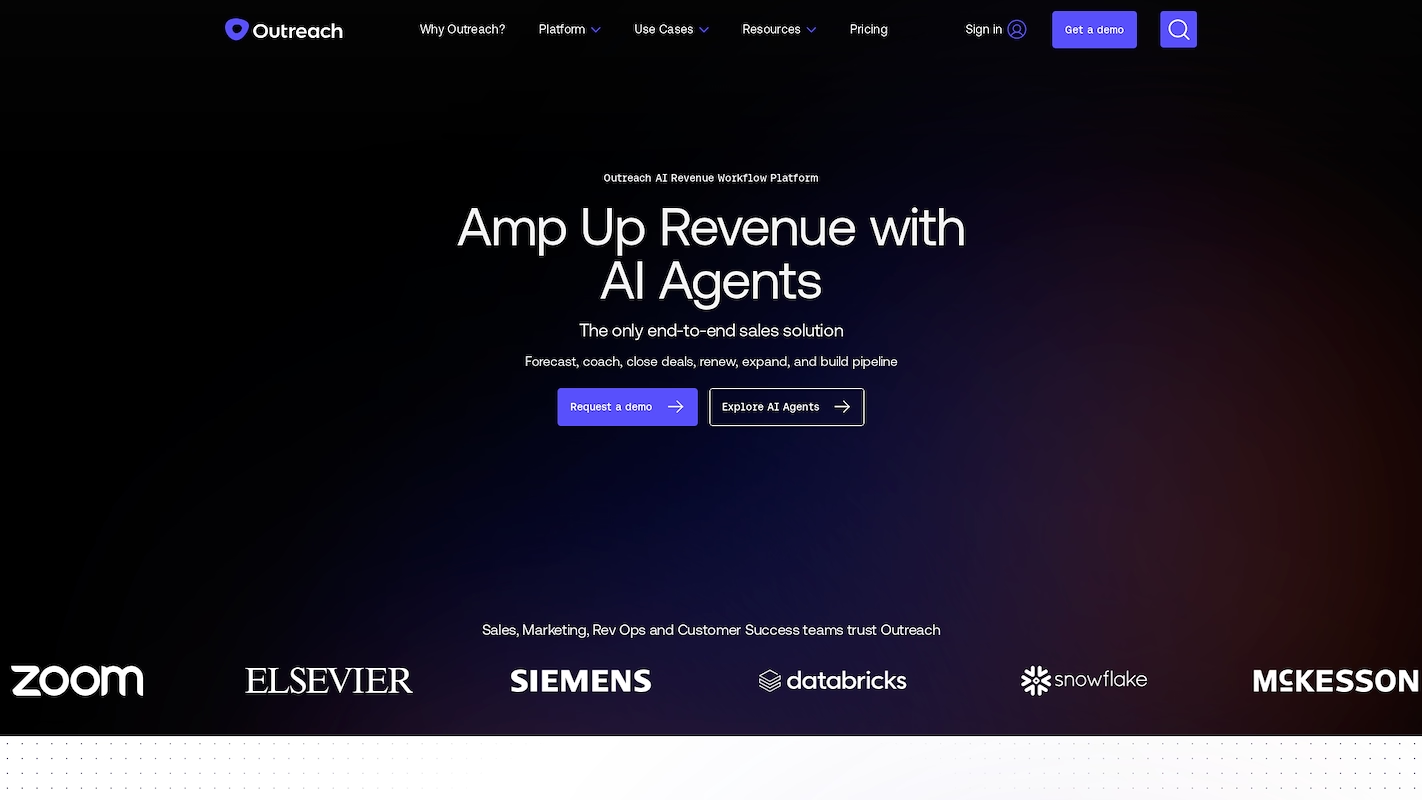
Outreach is a revenue intelligence platform that helps sales teams manage workflows and buyer engagement. The system unifies sales execution, from prospect discovery to revenue forecast, into a single workspace. This allows teams to orchestrate their sales process and drive predictable growth.
Outreach's Main Features
Provides calling capabilities with click-to-call functionality.
Sends automated emails and tracks engagement through open rates and link activity.
Offers analytics and insights to track sales performance and provide daily summaries.
How Outreach Compares to Leadbay
Average Review Score: 4.3/5 stars based on 3,479 G2 reviews.
Outreach unifies sales engagement and revenue intelligence in one platform. This provides a more complete workspace than Leadbay, which focuses only on lead generation and score prediction.
The platform helps with revenue forecasts. This extends its function beyond Leadbay's scope, which is limited to the initial stages of the sales process.
It includes an AI Sales Assistant for various go-to-market activities. This is a different use of AI compared to Leadbay's predictive model for lead scores.
This tool provides email engagement metrics, such as open rates and link activity. This gives sellers direct feedback on their outreach, a feature not present in Leadbay's platform.
Outreach's Limitations Compared to Leadbay
Outreach lacks a predictive lead scoring engine. In contrast, Leadbay's core function predicts lead conversion, which helps sales teams focus on prospects who show high purchase intent.
The platform does not offer a specialized B2B contact database. Companies that need high-quality European data may find Leadbay's regional focus provides more consistent information for their market.
Its wide range of features can create a steeper learning curve. Leadbay provides a more direct user experience for teams that need a simple tool for lead generation and scoring.
Pricing and Cost-Effectiveness
Both Outreach and Leadbay use a quote-based pricing model, so you will need to contact them for a custom quote. For the most accurate pricing information, visit Outreach's official website.
Which One Should You Go With?
Choosing the right Leadbay alternative depends on your specific business needs, budget, and sales process. This guide reviewed several top options, comparing their features and limitations to help you make an informed decision.
If your team is exploring sales automation, 11x offers a different approach with AI agents that handle specific sales development tasks. These digital workers can manage prospecting, outreach, and CRM updates, which may fit organizations looking to automate parts of their sales process.




